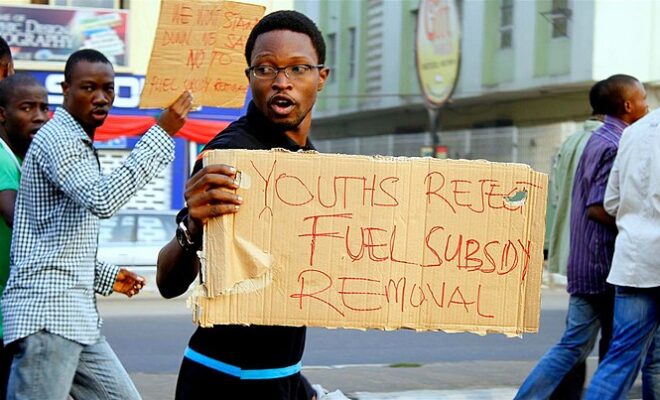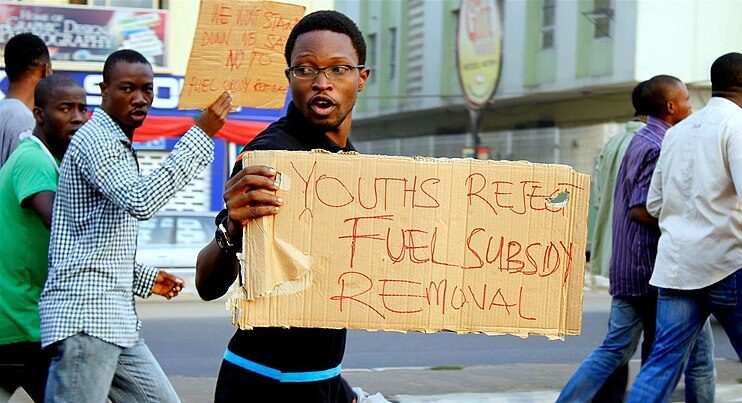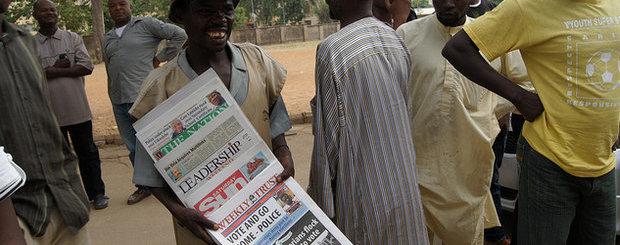How (and why) Nigeria should remove its fuel subsidy

Nigeria spends a quarter of its budget on a regressive fuel subsidy. Removing it and distributing the savings can help the poorest.

When a previous government tried to remove the fuel subsidy in 2012, it prompted large protests across Nigeria. Credit: Kolawole Oreoluwa.
Nigerians are being hit from all sides by factors that are making their lives more difficult. These include the rising cost of living, which is reflected in double-digit inflation, stagnant wages, non-payment or the late payment of salaries, a cash crunch, and fuel scarcity. A defining moment for Nigerians could come after the swearing-in of Nigeria’s new president on 29 May. It is expected that President-elect Bola Ahmed Tinubu will jettison Nigeria’s fuel subsidy, which is estimated to cost the treasury about $10 billion annually. This is about 24% of Nigeria’s 2022 budget.
Fuel subsidies have been in place in Nigeria since the 1970s. They began with the government routinely selling petrol at below cost. But most Nigerians were unaware that this was being done. Fuel subsidies became institutionalised in 1977, following the promulgation of the Price Control Act, which made it illegal for some products (including petrol) to be sold above the regulated price. This law was introduced by the General Olusegun Obasanjo regime to cushion the effects of the surging inflation across the world, caused by increases in energy prices.
In recent years, the World Bank has been urging Nigeria to remove the fuel subsidy. It argues that failure to do so would exacerbate the country’s fiscal challenges and worsen its debt profile. The outgoing administration agreed and said the subsidy would be removed in June 2023 but later suspended this plan in late-April.
There are concerns the removal of the subsidy would impose further hardships on Nigerians by raising fuel and transportation costs. This would erode their real purchasing power and increase the number of the working poor. As an economist and Nigerian, I have followed debates around subsidies particularly closely. I have found that fuel subsidies are not only unsustainable and inequitable; they also lack a sound economic rationale. Political considerations appear to take precedence over economic logic in this debate. Previous administrations have baulked at getting rid of the fuel subsidy.
In my view, removing it could benefit workers and poor Nigerians – if carefully managed and implemented. The fuel subsidy should be discontinued and a significant portion of the savings distributed to low-income Nigerians. Resentment toward subsidy removal can be avoided if better alternatives are explained.
Three reasons subsidies are bad
Over-consumption
Setting fuel prices below market prices encourages over-consumption, with no significant linkage effects on other sectors of the economy. Linkages are usually created when the consumption of a good or service results in the emergence of new economic activities. Consuming fuel beyond a socially optimal quantity does not have that effect. Instead, it diverts resources away from more productive sectors of the economy. The global trend is to discourage fuel consumption by making it more expensive through higher sales taxes. And by discouraging investment in fossil fuel projects.
Negative outcomes
Subsidising fuel exacerbates pollution, global warming, and road accidents – what economists call negative externalities. This is when one person’s actions negatively affect other people that are not part of the actions.
Inequality
Subsidies reinforce inequality. The artificial reduction in the market price of fuel benefits upper income households the most because they are the ones who use the most fuel. They own the most cars in Nigeria, especially the ones that guzzle petrol. Nigeria is among the countries with the least number of vehicles per capita, with 0.05 vehicles per person or 50 vehicles per 1000 Nigerians. With an abysmally low minimum wage of N30,000 ($65) per month and non-availability of car loans, most Nigerian workers cannot afford a car.
Solutions
Raise productive capacity
The savings of removing the subsidy should be used to build the productive capacities of Nigerians. These are described by the UN Conference on Trade and Development as: “the productive resources, entrepreneurial capabilities and production linkages that together determine a country’s ability to produce goods and services that will help it grow and develop.”
Nigeria urgently needs to increase its productive capacities. It could achieve this through:
- cash subsidies for restarting moribund but viable industrial enterprises
- the provision of subsidised agricultural inputs for farmers
- loans to students in tertiary institutions
- scholarships for those studying subjects that support industrial development
- investment in technology
- massive investment in infrastructure, with priority for projects that use direct labour and
- a special loan programme for entrepreneurs in the informal sector.
Investments such as these would ensure Nigeria gets the biggest bang for its buck, rather than the current wasteful spending on the corruption-infested fuel subsidies regime. Nigeria’s fuel subsidies have encouraged arbitrage, whereby unscrupulous business people buy fuel at the subsidised price and resell it at a higher price across the country’s borders. This practice is partly responsible for the perennial fuel scarcity in Nigeria.
Cash transfers
Savings from scrapping the fuel subsidy could be used to augment Nigeria’s Conditional Cash Transfers programme. This was introduced in 2016 as part of the Buhari administration’s Social Investment Program (SIP). Eligible individuals are entitled to a monthly cash payment of N5,000 (about $11). But only 784,176 individuals received the payment in 2020.
Fuel subsidy removal will enable the government to significantly increase this number. Individuals with an income of N30,000 ($65) per month or less should qualify for a new cash transfer program. It can be designed to last for six months.
To cushion the effects of subsidy removal, the Nigerian government has also obtained an $800 million relief package from the World Bank. The money, which should be added to the pool of funds available for the conditional cash transfer program, is expected to be distributed to 10 million households as cash.
Apart from being an assurance that the government does care for them, a cash transfer would also help stimulate the economy by spurring the demand for goods and services, which has been stagnant. The inflationary impact of cash transfers from fuel subsidy savings will be minimal, since new money is not created in the economy. In any case, inflation in Nigeria is mainly due to supply constraints, rather than demand.
Safety nets
There are no institutionalised safety net programmes for most Nigerians, which is why they regard the fuel subsidy as one way in which the government supports poor people. The harsh reality is that fuel subsidies benefit mainly upper class households, who consume most of the fuel in Nigeria. To overcome the perception – and to provide genuine support for those struggling to survive – the government should use the savings to subsidise mass transport systems, agricultural inputs, education, affordable healthcare, and low-income housing.
A lasting legacy
At first blush, one might think it’s politically risky for the Tinubu administration to start on the rocky foundation of scrapping Nigeria’s fuel subsidy. But fixing difficult and politically unpopular economic problems is a hallmark of effective leadership. If implemented properly, fuel subsidy removal may be an important legacy of the Tinubu administration, one that will differentiate him from past administrations.![]()
This article is republished from The Conversation under a Creative Commons license. Read the original article.




